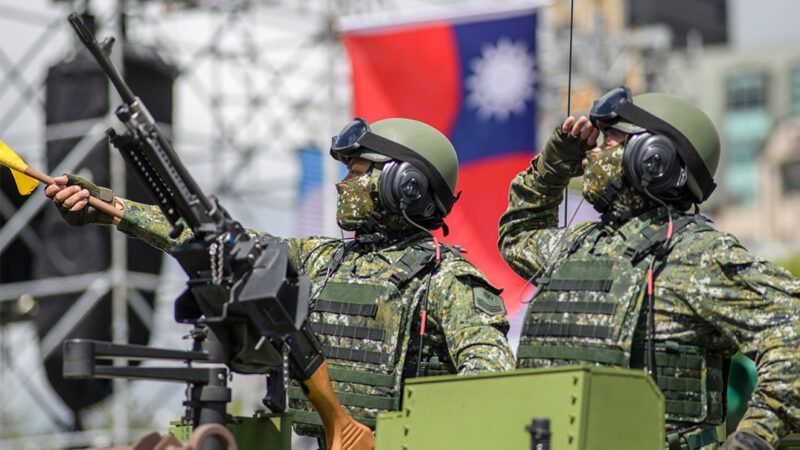If China Invades, Taiwan Shouldn't Count on U.S. Support
Compared to Russia, war with China is a deeper nightmare.

It was inevitable that U.S. military and economic support for Ukraine's self-defense against Russia would spark comparisons to our relationship with Taiwan. Each country is not exactly a U.S. ally but is unquestionably friendly, relatively democratic, and endangered by one of just two remotely plausible challengers for the title of global superpower.
"China is watching what we do in Ukraine," Sen. Richard Blumenthal (D–Conn.) said on CNN in August, arguing that expanded U.S. aid to fight Moscow could double as a warning to Beijing: If we back Ukraine to the hilt, perhaps Taiwan will never need the same help.
There is no denying that Beijing is watching. But we—and, more important, Taipei—should be wary of overdrawing this comparison. For all the similarities, there are real differences here, and the war in Ukraine itself remains a live factor in how the U.S. would respond to a Chinese attack on Taiwan. The most prudent assumption is that Taiwan remains its own best defender, whatever U.S. support for Ukraine might suggest.
Perhaps the most significant difference between these two situations is that between China and Russia. While both are formidable nuclear-armed international rivals to the U.S., Russia is a declining power with an ill-equipped and outdated military that has been forced to conscript old men in its war against a smaller, poorer country. It has a defense budget one-tenth of America's and a gross domestic product (GDP) smaller than Italy's. Despite the self-sabotage of its zero-COVID policies, China remains a rising power with an expanding military, a defense budget around a third of the Pentagon's, and the second-largest GDP in the world. Russia's nuclear arsenal poses a more serious threat, but China's growing stockpile could still do much damage.
If we must dabble in the absurd horror of ranking great-power conflicts, war with China is the deeper nightmare. In a 2022 Taiwan war game run by the Center for Strategic and International Studies, the U.S. prevailed over Beijing, but only at a terrible cost. According to a Military Times report on the exercise, a U.S. military defense of Taiwan against a Chinese invasion "would likely devolve into brutal large-scale combat neither nation has seen in decades" and entail casualties that would be "historic by any modern measure."
Then there are the less tangible distinctions. Would Taiwan receive the broad and consistent compassion from the U.S. public that Ukraine has? How many Americans would hang Taiwan's flag on their porches and businesses? Soon after Moscow's invasion, some claimed white Americans and Europeans cared only because Ukrainians are racially and culturally similar to them. That claim, while overblown, was not groundless, and we know from psychological research that our brains have in-group bias: Americans' ethnic and cultural distance from Taiwan could have political consequences.
President Joe Biden's verbal recklessness regarding Taiwan could be a relevant difference too. With Ukraine, Biden has clearly stated that the U.S. "will not be directly engaged in this conflict" and does not seek regime change in Moscow. By contrast, he has four times committed the United States to fight on Taiwan's behalf, contradicting longstanding U.S. policy and raising Beijing's ire. Those statements could inspire new caution in the next administration, making the U.S. less inclined to respond to a Chinese attack than it otherwise would be.
Depending on Beijing's timing, Washington might also be restrained by a long-term conflict in Ukraine. We do not know when or how this war will end, and there is no sign that the West's vision of a contrite and retreating Russia is anywhere near being realized.
In November, the Biden administration reportedly began encouraging both Ukraine and Russia to signal openness to negotiation. That outreach and Biden's public specification of limits on the U.S. role in Ukraine show an impulse toward prudence. But neither is evidence of any concrete plan to keep Ukraine from becoming a new forever war by proxy for the United States.
That, too, could have consequences for Taiwan. The very war that provides a model of U.S. support might make that support less feasible. Understandably, leaders in Taipei hope Washington will do for them what it has done for Kyiv. But they'd be rash to count on it.
This article originally appeared in print under the headline "Taiwan Shouldn't Count on U.S. Support".

Show Comments (56)